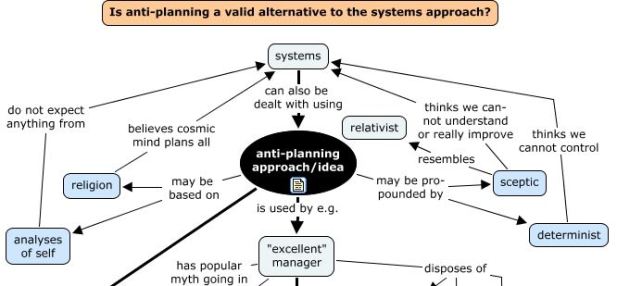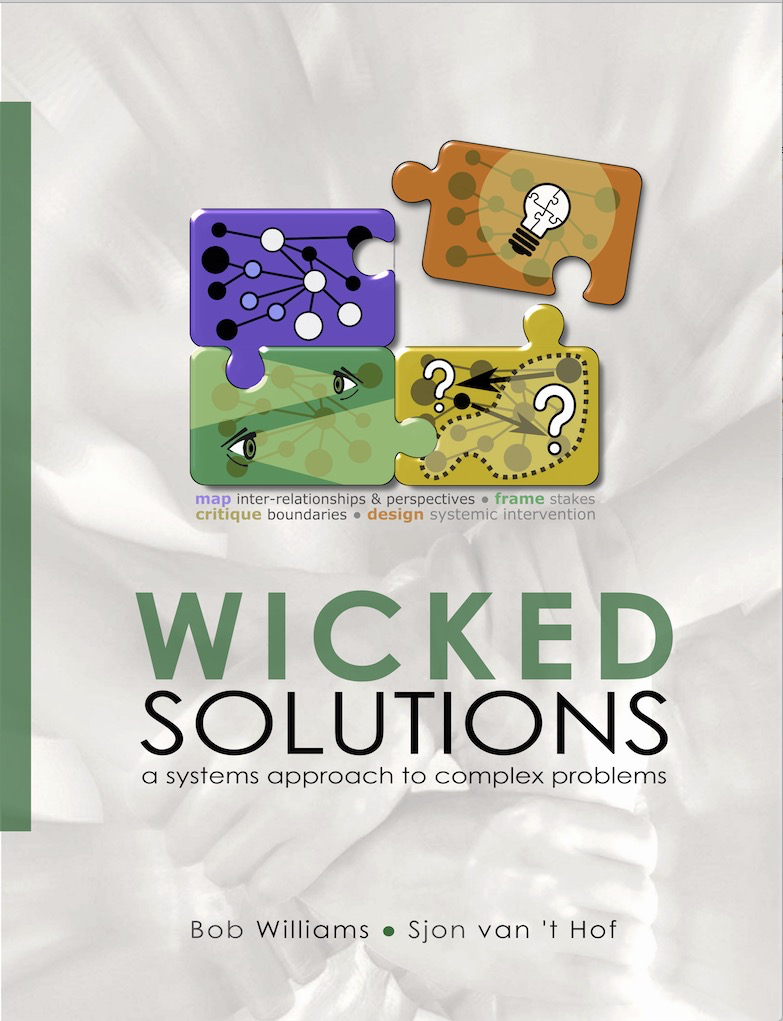Is anti-planning a valid alternative to the systems approach?
‘Anti-planning’ is the term Churchman uses to describe various non-systemic approaches to the world’s systemic problems. How people actually think they can address systemic problems asystemically is hard to fathom, but they do. One of the myths that keep them on that track is that of the ‘excellent manager’. Another problem is that people are often unable to identify a complex, systemic (or wicked) problem, especially if they are in the middle of it (see my post ‘It’s a wicked problem, stupid!‘). A final problem is the complexity of systems thinking, the systems approach in particular. This is discussed in ‘The hidden workings of Wicked Solutions‘.
Churchman C. West Churchman (USA, 1913-2004) was a pioneer in systems thinking, both hard (operations research) and soft (the systems approach, social systems design). Over the past month I have been reading (in) The Systems Approach (1968), The Design of Inquiring Systems (1971), and The Systems Approach and its Enemies (1979). Churchman intended these books for a general audience, but the audience can no longer benefit of his insights, since none of these books are available anymore, except in university libraries (often far away) and second hand (at relatively high cost). It made me wonder about sharing knowledge in the Internet age. Could Churchman’s insights be excerpted in the form of a knowledge model (see Cañas, Hill & Lott, 2003)? What follows is my first dash at such a model. It deals with the final 2 chapters of The Systems Approach.

For a quick scan of this blog post, click on the image to go the dynamic concept map at IHMC.
If you are not acquainted with concept maps, read the blog post first.
Anti-planning Systems thinking could be said to be based on “planning philosophy”: reason and observation allow systems thinking to lay out the structure of a system and decide what changes should occur to best serve the customers of the system. Anti-planning is the idea that this “planning philosophy” is not valid. Anti-planning comes in many forms that will be discussed one by one:
- The “excellent” manager …. is the one who quickly takes the right decisions due to his experience, perceptive mind, and intuition. He/she assumes leadership easily and has a powerful and popular myth going in the USA and elsewhere.
- The skeptic …. thinks we cannot understand or really improve systems. The skeptic is usually the ultimate pessimist: even if we do everything faster than ever before, it is just one more manifestation of the silliness of the human race.
- The determinist …. believes major human decisions are not in the hands of human decision makers, but in uncontrolled sociological forces (and, indeed, sometimes the decision maker is hard to find; TSA 218). Studying systems by science is a by-product of a militarized and industrialized society.
- Religion …. is based on the belief that a cosmic mind plans all. It claims that humans should abstain from meddling with divine planning. What guarantee is there that systems thinking is going to lead the human race anywhere?
- Analysis of self This approach is based on a wide variety of analyses of self, incuding: solipsism (total systems are nonsense), power-obsessionism (risks becoming slave to obsession), conservatism (aims to keep possessions and ideas), nihilism (all existence is trivial), revolutionarism (is simply the reverse of conservatism), here-and-nowism (denies meaning to ends and means), visionarism (risks finding the devil). All these analyses do not expect anything from systems.
The importance of anti-planning In Churchman’s view anti-planning is a fundamental part of the systems approach. It is good for planning adherents to keep in mind that anti-planning has some good things going for it. Besides, science – the foundation of all planning – is itself not a monument of truth but subject to considerable change (i.e. “deception”). According to Churchman the main claim to fame of the systems approach is the expansion of our capacity for inquiry (SH): “The ultimate meaning of the systems approach, therefore, lies in the creation of a theory of deception and in a fuller understanding of the ways in which the human being can be deceived about his world and in an interaction between these different viewpoints.” (TSA 229-230)
The deception-perception principles Churchman concludes that the essence of the systems approach is confusion as well as enlightenment. Our most critical problem today is understanding the systems we live in, but the problem of the appropriate approach to systems (and wicked problems) has not been solved. Therefore, it is in the nature of systems to have a continuing perception and deception, a continuing reviewing of the world , of the whole system, and of its components. These are inseparable from human living (and politics). He concludes with formulating 4 principles of a deception-perception approach to systems:
- The systems approach begins when first you see the world through the eyes of another. The systems approach begins with philosophy, which allows the serious student to see the absolute validity of the widely diverging world views of Plato, Leibniz, Kant and the like without losing his own individuality and showing him that the real world is modeled, experienced, dialectical, etc.
- The systems approach goes on discovering that every world view is terribly restricted. Or, in Churchman’s words (TSA, 231): “Every world view looks only at a component of some other system. For those who think in the large, the “world” is forever expanding; for those who think in the small, the inner world is forever contracting.”
- There are no experts in the systems approach. The public always knows more than any expert (SH: or politician). The problem of the systems approach is to learn what “everybody” knows. “At the same time, the real expert is still Everyman, stupid, humorous, serious, and comprehensive all at the same time.” (TSA 231-232).
- The systems approach is not a bad idea.
Prospects for a knowledge model CmapTools provides a range of features that allow users to easily construct knowledge models, either alone or in collaboration. The use of links (e.g. to text documents, but also to videos, images etc. ) allows for concept maps that are relatively uncluttered. To avoid a proliferation of text documents, I attempted to embed some short bits of concept information as mouse-over text: that works well on my desk top, and would also work well for team members, but doesn’t seem to work in the online concept map. It can be concluded that the knowledge model technology of CmapTools can be used for excerpting complex information in a way that should allow for easy self-learning by blog visitors.


